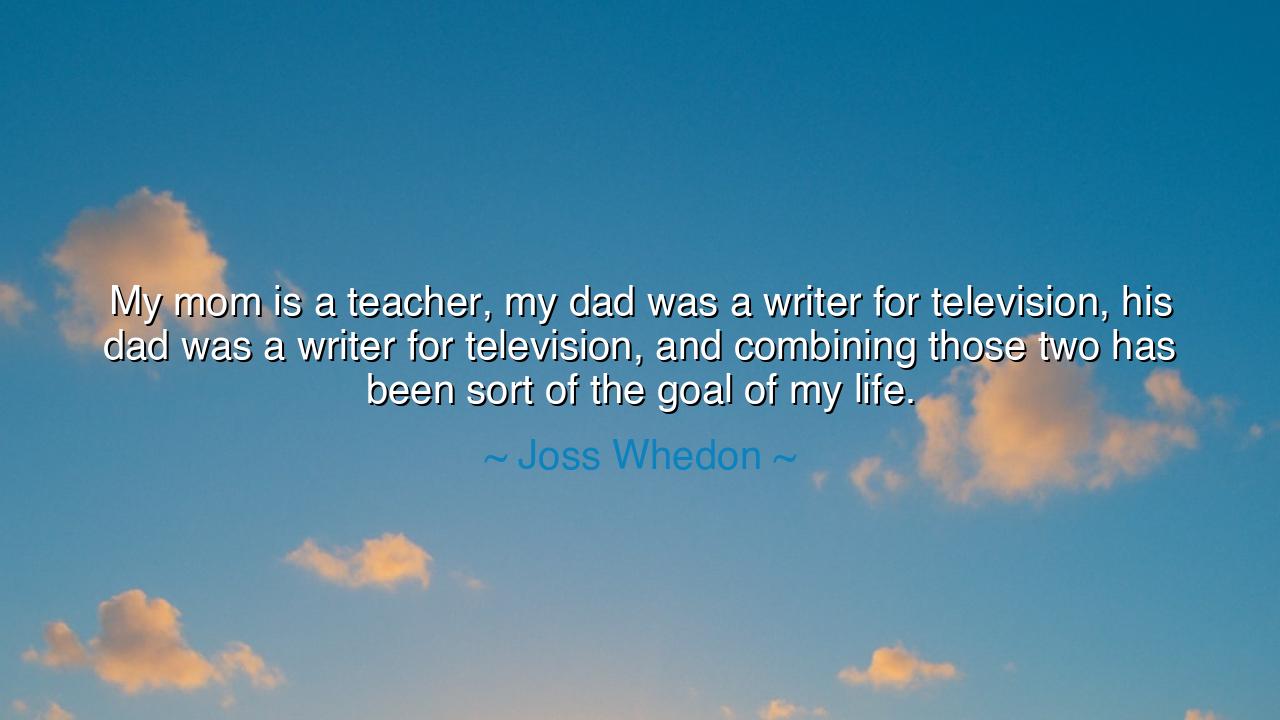
My mom is a teacher, my dad was a writer for television, his dad
My mom is a teacher, my dad was a writer for television, his dad was a writer for television, and combining those two has been sort of the goal of my life.






Joss Whedon once revealed of himself: “My mom is a teacher, my dad was a writer for television, his dad was a writer for television, and combining those two has been sort of the goal of my life.” In these words, we hear not only a personal history but the echo of inheritance, destiny, and choice. They speak of how a soul is shaped by the lineage from which it springs: the clarity of the teacher, the imagination of the writer, and the calling to bring them together into one life’s work.
To be born of a teacher is to be born in the presence of one who illuminates, who cultivates the minds of others. The teacher’s art is not merely instruction but the planting of seeds, the nurturing of curiosity, the careful guidance of the soul toward wisdom. To be born of writers is to inherit the fire of storytelling—the weaving of words into worlds, the power to shape imagination and culture. In Whedon’s life, these two streams converged: the precision of knowledge and the passion of narrative. His confession shows that his goal has always been to reconcile them, to teach through story, to instruct through art.
The ancients too understood the union of teaching and storytelling. Homer, by singing the tales of heroes, was both poet and teacher, shaping the moral imagination of Greece for generations. Confucius spoke not only through maxims but through parables, embedding wisdom in stories that the common man could remember. In every age, the true power lies not in teaching alone, nor in writing alone, but in the fusion of the two—the word that instructs while it enchants, that educates even as it entertains.
Consider the story of Aesop, the ancient fabulist. His fables, simple in form, carried truths profound enough to shape civilizations. By using animals to tell his tales, he reached children, peasants, and kings alike. He was, in essence, both teacher and writer, showing through story what sermons alone could not achieve. Whedon’s words resonate with this same tradition: to take the craft of writing and infuse it with the spirit of teaching, to reach not only the mind but the heart of his audience.
There is a heroic challenge hidden in this ambition. For to balance teaching and storytelling is to walk a narrow path. Too much of the teacher, and the work becomes dry, lifeless. Too much of the storyteller, and it becomes mere amusement, void of depth. The greatness lies in the union: to create stories that entertain yet carry truth, to teach lessons not through lectures but through laughter, drama, and wonder. This balance, Whedon suggests, has been his life’s goal, a task as noble as any ancient quest.
The lesson for us is clear: look to your own inheritance, whether of family, culture, or circumstance, and seek to weave from it your unique destiny. Perhaps you too are the child of two rivers, two streams of influence seemingly separate. Do not ignore them. Ask yourself: How may these be joined? For in the union of what we inherit lies the secret of our originality. Just as Whedon sought to combine the clarity of his mother’s teaching with the imagination of his father’s writing, so each of us must learn to unite the gifts given to us by those who came before.
Practical action flows from this: study your own story. Write down the influences of your family, your mentors, your culture. Identify the threads that may seem disconnected, and dare to braid them together into something new. Do not dismiss what seems ordinary—like a mother who teaches, or a father who writes—for in those ordinary roots may lie the extraordinary flowering of your destiny. And as you pursue this union, aim always to create work that does more than serve yourself: let it teach, let it inspire, let it give light to others.
Thus, Joss Whedon’s words are more than autobiography. They are a reflection of an eternal pattern: the soul inherits gifts from its lineage, but it is the task of the individual to combine them, to forge them into a singular goal, and to offer them back to the world. And so we may say, as the ancients did: greatness is born not of inheritance alone, nor of ambition alone, but of the weaving together of both into one shining purpose.






AAdministratorAdministrator
Welcome, honored guests. Please leave a comment, we will respond soon